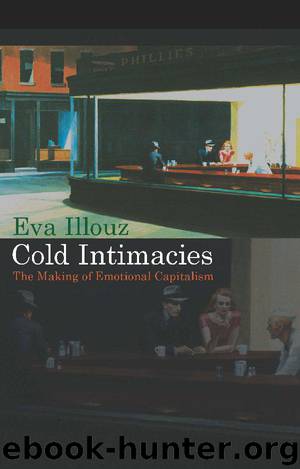Cold Intimacies: The Making of Emotional Capitalism by Eva Illouz

Author:Eva Illouz [Illouz, Eva]
Language: eng
Format: epub, azw3
Publisher: Wiley
Published: 2013-04-22T16:00:00+00:00
Emotional fields, emotional habitus
These various actors all converged in the creation of a realm of action in which mental and emotional health is the primary commodity circulated. They all contributed to the emergence of what I call an emotional field: that is, a sphere of social life in which the state, academia, different segments of cultural industries, groups of professionals accredited by the state and university and the large market of medications and popular culture intersected to create a domain of action and discourse with its own rules, objects, and boundaries. The rivalry between various schools of psychology, or even the rivalry between psychiatry and psychology, should not hide the fact that they ultimately agree on defining emotional life as in need of management and control and on regulating it under the incessantly expanding ideal of health. A great variety of social and institutional actors compete with one another to define self-realization, health, or pathology, thus making emotional health into a new commodity produced, circulated, and recycled in social and economic sites which take the form of a field. The narrative of suffering should be viewed as the outcome of the extraordinary convergence between the different actors positioned in the field of mental health.
Fields, Bourdieu tells us, maintain themselves through the mechanism of habitus or “the structuring mechanism that operates from within agents.”46 Not only do emotional fields work by constructing and expanding the realm of the pathological and by commodifying the realm of emotional health, but also by regulating access to new forms of social competence which I will dub emotional competence. In the same way that cultural fields are structured by cultural competence – the capacity to relate to cultural artifacts in a way that signals familiarity with high culture sanctioned by the upper classes – emotional fields are regulated by emotional competence, or the capacity to display an emotional style defined and promoted by psychologists.
Like cultural competence, emotional competence is translatable into a social benefit, as professional advancement or social capital. Indeed, for a particular form of cultural behavior to become a capital, it must be convertible into economic and social benefits; it must be convertible into something that agents can play with in a field, that will give them a right of entry, or will disqualify them, or will help them seize what is at stake in that field.47 Even more than traditional forms of cultural capital – such as wine-tasting or familiarity with high culture – emotional capital seems to mobilize the least reflexive aspects of habitus. It exists in the form of “long-lasting dispositions of mind and body” and is the most “embodied” part of the embodied forms of cultural capital.48
In the American context, emotional competence is most formalized in the workplace, and most particularly in the personality tests that were instituted to hire people in corporations. Personality tests are to emotions what scholastic tests are to cultural capital, namely a way to sanction, legitimize, and authorize a specific emotional style, an emotional style which in turn has been shaped by the psychoanalytical persuasion.
Download
Cold Intimacies: The Making of Emotional Capitalism by Eva Illouz.azw3
This site does not store any files on its server. We only index and link to content provided by other sites. Please contact the content providers to delete copyright contents if any and email us, we'll remove relevant links or contents immediately.
International Integration of the Brazilian Economy by Elias C. Grivoyannis(111059)
The Radium Girls by Kate Moore(12028)
Turbulence by E. J. Noyes(8049)
Nudge - Improving Decisions about Health, Wealth, and Happiness by Thaler Sunstein(7706)
The Black Swan by Nassim Nicholas Taleb(7129)
Rich Dad Poor Dad by Robert T. Kiyosaki(6632)
Pioneering Portfolio Management by David F. Swensen(6300)
Man-made Catastrophes and Risk Information Concealment by Dmitry Chernov & Didier Sornette(6019)
Zero to One by Peter Thiel(5801)
Secrecy World by Jake Bernstein(4753)
Millionaire: The Philanderer, Gambler, and Duelist Who Invented Modern Finance by Janet Gleeson(4478)
The Age of Surveillance Capitalism by Shoshana Zuboff(4292)
Skin in the Game by Nassim Nicholas Taleb(4248)
The Money Culture by Michael Lewis(4207)
Bullshit Jobs by David Graeber(4190)
Skin in the Game: Hidden Asymmetries in Daily Life by Nassim Nicholas Taleb(4006)
The Dhandho Investor by Mohnish Pabrai(3764)
The Wisdom of Finance by Mihir Desai(3746)
Blockchain Basics by Daniel Drescher(3582)
